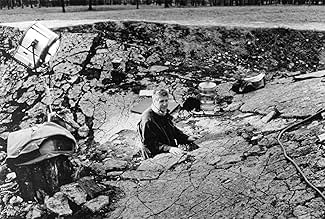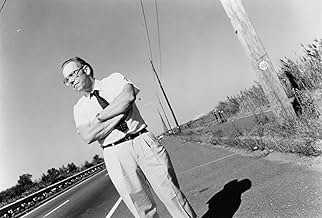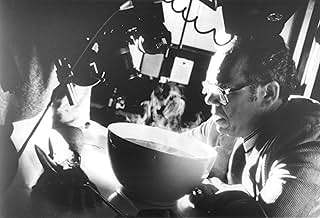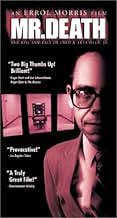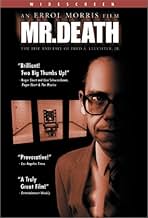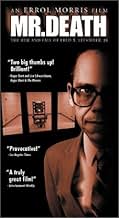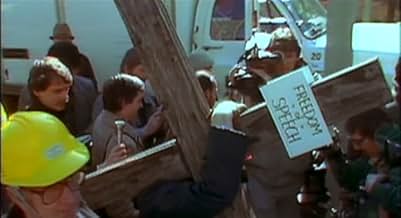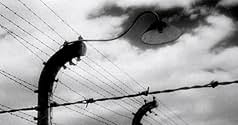VALUTAZIONE IMDb
7,5/10
5916
LA TUA VALUTAZIONE
Aggiungi una trama nella tua linguaA cinematic portrait of the life and career of the infamous American execution device designer and holocaust denier.A cinematic portrait of the life and career of the infamous American execution device designer and holocaust denier.A cinematic portrait of the life and career of the infamous American execution device designer and holocaust denier.
- Premi
- 1 vittoria e 8 candidature totali
Fred A. Leuchter Jr.
- Self
- (as Fred Leuchter)
Caroline Leuchter
- Self
- (voce)
Adolf Hitler
- Self - Leaves Plane
- (filmato d'archivio)
- (non citato nei titoli originali)
Errol Morris
- Self - Interviewer
- (voce)
- (non citato nei titoli originali)
Recensioni in evidenza
Errol Morris has certainly 'injected' (pardon my contextural
pun) a bit of energy into the documentary form, even if the
films he makes lie somewhere outside its confines. Mr Death,
with its characteristic visual flourishes and tangents, is no
exception to this, though it does contain excerpts of a 'true'
documentary of Leuchter pilfering 'evidence' from Auschwitz.
Morris' film refutes Leuchter's findings to the point that the
only viewer who would give tham any credence would have to be as
biased as Ernst Zündel, the revisionist publisher whom
Leuchter's testimony defended. One detail of the film sticks out
in my mind... the home movies of young Leuchter accompanying his
father to work at the local prison, where he pals around with
the convicts, and explains how he learned at this tender age to
pick locks, pockets and safes... and with audible smugness
relates that these skills have actually aided him later in life.
The image of this boy nebbish, undoubtedly an outcast and loner
at school and socially, gaining acceptance amongst the convicts
helps to explain why such an intelligent and resourceful person
could be duped by the likes of the pinheaded, hateful Neo-Nazi
Revisionists. Here's a group of 'bad guys' accepting, applauding, listening and agreeing to Leuchter. Of course this
is because his undeniably faulted research supports their own
misguided conclusions. But it mirrors his experiences as a boy
among the convicts and provides a strong psychological
foundation for Leuchter's downfall into his delusional world. I'd recommend this film to anyone who enjoys thought-provoking
cinema, realizing that they are sadly in a minority amongst
filmgoers.
pun) a bit of energy into the documentary form, even if the
films he makes lie somewhere outside its confines. Mr Death,
with its characteristic visual flourishes and tangents, is no
exception to this, though it does contain excerpts of a 'true'
documentary of Leuchter pilfering 'evidence' from Auschwitz.
Morris' film refutes Leuchter's findings to the point that the
only viewer who would give tham any credence would have to be as
biased as Ernst Zündel, the revisionist publisher whom
Leuchter's testimony defended. One detail of the film sticks out
in my mind... the home movies of young Leuchter accompanying his
father to work at the local prison, where he pals around with
the convicts, and explains how he learned at this tender age to
pick locks, pockets and safes... and with audible smugness
relates that these skills have actually aided him later in life.
The image of this boy nebbish, undoubtedly an outcast and loner
at school and socially, gaining acceptance amongst the convicts
helps to explain why such an intelligent and resourceful person
could be duped by the likes of the pinheaded, hateful Neo-Nazi
Revisionists. Here's a group of 'bad guys' accepting, applauding, listening and agreeing to Leuchter. Of course this
is because his undeniably faulted research supports their own
misguided conclusions. But it mirrors his experiences as a boy
among the convicts and provides a strong psychological
foundation for Leuchter's downfall into his delusional world. I'd recommend this film to anyone who enjoys thought-provoking
cinema, realizing that they are sadly in a minority amongst
filmgoers.
I have never seen a movie handle moral ambiguity quite like this before. It's ambiguous on so many levels. FL Jr. worries about the humanity of the methods of execution, and it never occurs to him that the act itself is inhumane. The obvious hatred in the face of Shelly Shapiro (leader of a Holocaust remembrance group) makes you wince at the moral ambiguity of her acts. And finally that this mouse of a man is neither Jesus nor Hitler (two comparisons made in the film) is the only firm footing you are left with. Not earth-shattering, but what a film!
Leuchter is an expert in execution technology (designer of electric chairs, gas chambers, etc.), whose career was wiped out when he got swept up in the Holocaust revisionism movement (he testified, as an expert witness in a defamation suit, that the Auschwitz crematoria could not and did not serve as gas chambers). In this vivid documentary, Morris lets Leuchter speak for himself (which reveals him to be a man of limited horizons with a - let's say - quirky moral code, likely undone by hubris rather than evil [although Morris may deliberately be making that as far as possible an eye-of-the-beholder issue]), while providing a blizzard of visual accompaniments that emphasize the lurid raw material of Leuchter's life (a strategy indicated by the B-movie undertone of the title), and flirt with his obvious sense of his own heroism. Leuchter has more than enough rope here to hang himself, and pretty much gets the job done. Morris doesn't try to explore the issue of Holocaust revisionism generally, pretty much taking our revulsion on faith: if anything, from my limited previous reading on the subject, that's doing Leuchter a favor. Anyway, revulsion or not, it's hard not to be fascinated by a man who can calmly chatter about his value-pricing approach to selling death machines (although custom made, he tells us, they're sold at "off the shelf" prices).
This is the story about how the world's foremost authority on gas chambers and all methods of executions proved that the Nazi "gas chambers" could have never operated the way historians claim. It completely destroyed his life, proving that Jews control the world. I assume Errol Morris wasn't intending on letting his feelings be known but it seems like he tries hard to make Leuchter look like a bad man and he consistently fails. It's really strange that he would make dramatic recreations of stuff that happened. That has no place in a documentary. The most interesting thing about the movie is that everyone who tries to discredit or insult Leuchter has absolutely no facts or real argument. They can only say things like he "desecrated a holy land" or "wasn't qualified". After the Jewish man who did the tests on the concrete samples and then testified that his results and report were 100% accurate and true, found out what the trial was about, he quickly says that he performed the wrong tests. The only argument anyone can muster is "you have to be crazy to say this". They claim Leuchter just wanted the spotlight but it's very clear that's not true. He was dragged into a court case and provided expert testimony, without bias. The only accurate statement his detractors made is that he came from nowhere and returned to nowhere. It's not only true, it's all he wanted and it doesn't even matter. This movie proves he is right.
This documentary presents the story of the rise and fall of Fred Leuchter, an apparently self-taught engineer specializing in the repair and fabrication of instruments of capital punishment. His choice to develop evidence to deny the existence of gas chambers at Auschwitz, Poland causes a descent into villainy and subsequent ostracism from his clients and his wife.
Several of Leuchter's detractors are interviewed in the film and vilify him as an anti-Semite and a perpetrator of a cruel hoax. His supporters portray him as the second coming of Christ and a man worthy of equal footing with George Washington. If Leuchter actually was aware of his place in the events that led to his downfall, then one could assume he falls somewhere between the two extremes. But this film amply demonstrates that in many ways, Fred in a class by himself.
This little man from Massachusetts grew up around the prison where his father worked, and he saw the daily life of both inmates and guards. He came to see both groups as his friends, and later in his life he chose to research ways to make execution equipment safer and more humane, not only for the inmates being executed, but also for the guards that have to deal with the psychologically disturbing business of execution.
Over time, he became prominent in his field, and was recognized as perhaps the only expert in the United States on repairing and building execution devices. It was this expertise that drew the attention of holocaust denier Ernst Zundel, who was on trial in Canada for publishing a document entitled "Did Six Million Really Die?", which the government of Canada argued was published with deliberate lies about Nazi execution of Jews. Leuchter was approached as an expert on execution and was asked to journey to Auschwitz to develop evidence to disprove that the crematories at that most infamous of concentration camps was used as execution chambers.
It is here that the mystery of Fred Leuchter begins. In the film, a holocaust denier relates a conversation he had with Leuchter in which he had asked Fred about his illegal and highly distasteful excavations at Auschwitz. Leuchter replied, "It wasn't what I found, but what I didn't find that blew me away." It is this statement that rings in my head when I try to examine Fred Leuchter's actions. Why didn't he think about what was being asked of him? Why didn't he see this inquiry in the larger scale of the history of the Second World War, and indeed in the history of civilization? Since he was so deliberate and so thoughtful in his research in to execution equipment, why did he not research the subject of the gas chambers at Auschwitz more thoroughly? Journalist Van Pelt explains that all he had to do was examine the archives at the camp to discover a wealth of information that the Nazis put together about the subject of the "gassing basements". Leuchter obviously understood nothing about the subject of chemistry (an absolutely necessary discipline to begin addressing the presence of cyanide on the bricks of the camp), and yet he took the job of disproving the existence of gas chambers. Why?
This is the area where Errol Morris' skill as a documentarian really shines. He shows Fred lurching around at various white supremacist meetings to discuss the findings of his report, apparently unaware of agenda he was sent to justify. As a thoughtful and deliberate man, he came to the conclusion that the chambers at Auschwitz could not have been used as execution chambers, but obviously uses his own narrow view point to reach that conclusion, since (in his opinion) if he had designed such a device for mass execution he would not have built it that way. He doesn't understand that he was pushed to present a certain result, and that the individuals that wanted justification for their viewpoints were not to be trusted. Morris lets us see all the swirling action around Leuchter, and demonstrates that Leuchter himself was unable or unwilling to see his place in the madness surrounding the trial, as well as demonstrating that Fred couldn't fully understand why state governments were suddenly unwilling to deal with him, killing his business as an execution engineer.
Leuchter's detractors took pains to ruin his life which, in a country that thrives on free speech and the open expression of ideas, is as shameful an act as Leuchter's own foolish holocaust denial. But an interviewee stated eloquently in the film that Fred had the chance to retract his statements. Fred at any time could have limited his involvement with the project. He should have conducted his investigation in the full light of day rather than slinking around a vitally important historical site, chopping up pieces of what many consider a holy shine to the lives of those callously murdered there. He could have done many things that any rational and considerate person should have done.
But he didn't.
Morris' film is one of the best examinations of a person's life committed to film. Highly recommended.
Several of Leuchter's detractors are interviewed in the film and vilify him as an anti-Semite and a perpetrator of a cruel hoax. His supporters portray him as the second coming of Christ and a man worthy of equal footing with George Washington. If Leuchter actually was aware of his place in the events that led to his downfall, then one could assume he falls somewhere between the two extremes. But this film amply demonstrates that in many ways, Fred in a class by himself.
This little man from Massachusetts grew up around the prison where his father worked, and he saw the daily life of both inmates and guards. He came to see both groups as his friends, and later in his life he chose to research ways to make execution equipment safer and more humane, not only for the inmates being executed, but also for the guards that have to deal with the psychologically disturbing business of execution.
Over time, he became prominent in his field, and was recognized as perhaps the only expert in the United States on repairing and building execution devices. It was this expertise that drew the attention of holocaust denier Ernst Zundel, who was on trial in Canada for publishing a document entitled "Did Six Million Really Die?", which the government of Canada argued was published with deliberate lies about Nazi execution of Jews. Leuchter was approached as an expert on execution and was asked to journey to Auschwitz to develop evidence to disprove that the crematories at that most infamous of concentration camps was used as execution chambers.
It is here that the mystery of Fred Leuchter begins. In the film, a holocaust denier relates a conversation he had with Leuchter in which he had asked Fred about his illegal and highly distasteful excavations at Auschwitz. Leuchter replied, "It wasn't what I found, but what I didn't find that blew me away." It is this statement that rings in my head when I try to examine Fred Leuchter's actions. Why didn't he think about what was being asked of him? Why didn't he see this inquiry in the larger scale of the history of the Second World War, and indeed in the history of civilization? Since he was so deliberate and so thoughtful in his research in to execution equipment, why did he not research the subject of the gas chambers at Auschwitz more thoroughly? Journalist Van Pelt explains that all he had to do was examine the archives at the camp to discover a wealth of information that the Nazis put together about the subject of the "gassing basements". Leuchter obviously understood nothing about the subject of chemistry (an absolutely necessary discipline to begin addressing the presence of cyanide on the bricks of the camp), and yet he took the job of disproving the existence of gas chambers. Why?
This is the area where Errol Morris' skill as a documentarian really shines. He shows Fred lurching around at various white supremacist meetings to discuss the findings of his report, apparently unaware of agenda he was sent to justify. As a thoughtful and deliberate man, he came to the conclusion that the chambers at Auschwitz could not have been used as execution chambers, but obviously uses his own narrow view point to reach that conclusion, since (in his opinion) if he had designed such a device for mass execution he would not have built it that way. He doesn't understand that he was pushed to present a certain result, and that the individuals that wanted justification for their viewpoints were not to be trusted. Morris lets us see all the swirling action around Leuchter, and demonstrates that Leuchter himself was unable or unwilling to see his place in the madness surrounding the trial, as well as demonstrating that Fred couldn't fully understand why state governments were suddenly unwilling to deal with him, killing his business as an execution engineer.
Leuchter's detractors took pains to ruin his life which, in a country that thrives on free speech and the open expression of ideas, is as shameful an act as Leuchter's own foolish holocaust denial. But an interviewee stated eloquently in the film that Fred had the chance to retract his statements. Fred at any time could have limited his involvement with the project. He should have conducted his investigation in the full light of day rather than slinking around a vitally important historical site, chopping up pieces of what many consider a holy shine to the lives of those callously murdered there. He could have done many things that any rational and considerate person should have done.
But he didn't.
Morris' film is one of the best examinations of a person's life committed to film. Highly recommended.
Lo sapevi?
- QuizAccording to A Brief History of Errol Morris (2000), Morris made a rough cut that he showed to colleagues and friends that only had Leuchter interviewed and it was Morris' intention that the audience would understand he was saying things either as lies or flat-out wrong. He was advised to go to Auschwitz and dig deeper so that there would be no doubt for the audience that Leuchter was wrong.
- Citazioni
Fred A. Leuchter Jr.: The human body is not easy to destroy and it's not easy to take a life humanely and painlessly without doing a great deal of damage to the individual's body.
I più visti
Accedi per valutare e creare un elenco di titoli salvati per ottenere consigli personalizzati
Dettagli
- Data di uscita
- Paesi di origine
- Lingua
- Celebre anche come
- Mr. Death
- Luoghi delle riprese
- Aziende produttrici
- Vedi altri crediti dell’azienda su IMDbPro
Botteghino
- Lordo Stati Uniti e Canada
- 507.941 USD
- Fine settimana di apertura Stati Uniti e Canada
- 24.125 USD
- 2 gen 2000
- Lordo in tutto il mondo
- 507.941 USD
- Tempo di esecuzione
- 1h 31min(91 min)
- Colore
- Mix di suoni
- Proporzioni
- 1.85 : 1
Contribuisci a questa pagina
Suggerisci una modifica o aggiungi i contenuti mancanti

